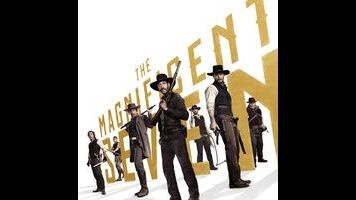That description alone should be enough for those familiar with John Sturges’ original Magnificent Seven to pick out how this version is more morally superficial than the already simplistic earlier one. The border crossing into Mexico—something that almost never figures in early classic Westerns, but which became an important motif in the 1960s—is gone, and so is any moment of commitment. The script, co-written by action hack Richard Wenk (The Equalizer, also directed by Fuqua) and True Detective creator Nic Pizzolatto, makes most of the seven nominal outsiders: They come from other countries or represent past wars. But there is a difference between coming together to defend a community that’s supposed to be inclusive of you (Rose Creek is oddly unprejudiced for an all-white town in the 1870s) and one that’s distinctly not “yours.” One common complaint about Sturges’ Magnificent Seven is that its heroes are too obviously good-hearted to be believable as amoral gunslingers turned soft, but that’s still more complicated than what this film offers. Simply put, there’s no moral weight: Chisholm is gunning for Bogue for reasons that have nothing to do with Rose Creek, while his compatriots are lucky if they’re provided an ounce of motivation.
Perhaps because of his reputation for a type of affected hard-boiled writing, one can’t help but chalk up the new Magnificent Seven’s more colorful turns of phrase to Pizzolatto, who gets his first-ever movie credit here. (“I got a family,” pleads one unlucky desperado. “They better off without you,” comes the retort.) These occasional one-liners and nihilistic truisms are all that the cast has to work with, and they don’t give much in the way of characterization. Ethan Hawke and Lee Byung-hun put in yeoman’s work as the lost cause marksman Goodnight Robicheaux and his knife-throwing protégé, Billy Rocks, respectively; they’re the only two characters who give the impression of having some reason to hang around each other, even if that reason is left vague. Jack Horne (Vincent D’Onofrio, speaking in a high, tight-chested yelp) mumbles his way into the group, while the Comanche Red Harvest (Martin Sensmeier) more or less materializes from the limbo where inscrutable magical Indians are kept when not needed. Faraday, the first to join Chisholm’s posse, is an inconsistent character, though maybe that’s because this kind of deadly rogue requires a darker charisma than Pratt (who compensates by doing an impression of Harrison Ford) can comfortably muster. Manuel Garcia-Rulfo’s Vasquez is all but forgotten by the movie, and Chisholm is a role that Washington could do in his sleep.
Fuqua, the prototypical journeyman who never rises above a script, doesn’t offer a contemporary take on this past-its-prime genre so much as an update to the mid-1990s, right down to the 35mm Panavision camerawork and a score by the late James Horner, completed by the composer’s longtime producer and arranger, Simon Franglen. There is some good to this Magnificent Seven’s commitment to an aesthetic that recalls the days when its PG-13 rating still represented a specific category of Hollywood entertainment; for one, Fuqua and cinematographer Mauro Fiore actually bother to frame shots of people getting hit by gunfire. But though it has its handsome moments—like a shot of Chisholm on horseback against a bluish dusk, dressed head to toe in black—the only thing animating the movie is the internal conflict between the rote and the strained, the tedious buildup to the final showdown and the cookie-cutter anti-corporate theme. (God help those in our take-based media economy who will find themselves writing about the unifying Chisholm and the rich-boy demagogue Bogue as Obama and Trump figures should this movie become a hit.)
More importantly, copying an earlier era’s empty slickness still produces only empty slickness. If there was ever any doubt that Fuqua—who lucked out with his third feature, Training Day, but whose résumé mostly consists of inessentials like The Replacement Killers, Shooter, and Olympus Has Fallen—really isn’t much of an action director, then the climax of The Magnificent Seven should settle that once and for all. A full-scale siege with trenches and a Gatling gun operated by a one-eyed Bogue henchman, it’s stiff and geographically incomprehensible, never clarifying who might be coming from where and in which direction. Like the lengthy scenes of speechifying (often accompanied by a useless prop visual aid, because that’s more “cinematic”), it suggests an imperfect impression of what movies are supposed to be. The Magnificent Seven is self-aware enough to reference the long-standing interchange between Western and Japanese genre fiction (Red Harvest is also the title of a Dashiell Hammett novel sometimes cited as the inspiration for Kurosawa’s Yojimbo), but not enough to bother being more than perfunctory. It does, however, end with the dumbest voice-over in recent memory. At least it’s got that.

























![Rob Reiner's son booked for murder amid homicide investigation [Updated]](https://img.pastemagazine.com/wp-content/avuploads/2025/12/15131025/MixCollage-15-Dec-2025-01-10-PM-9121.jpg)















